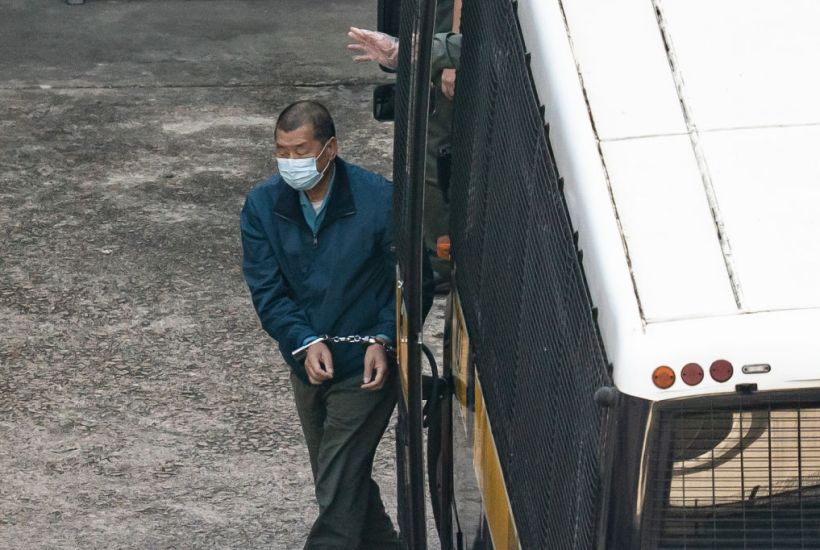Have you heard about the British citizen facing the prospect of spending the rest of his life in a Chinese prison? Perhaps not, because the case – the cause, indeed – of Jimmy Lai has not attracted quite the level of attention in this country that you might expect.
Last week, Lai – founder of the pro-democracy Apple Daily newspaper – was convicted of fraud in Hong Kong. To the outside, lay, observer the case seemed suspicious: it involved the subletting of an office and a five year prison term, a disproportionate response even if you accept – as you need not – a crime had been committed.
The fraud case, however, is merely an amuse bouche. The real action comes when Lai, who is 75, will be tried for, among other things, sedition under the terms of Hong Kong’s now-infamous National Security Law. That is what brings the potential for a life sentence assuming – and I think we may indulge this assumption – the court returns a guilty verdict. His real crime is simple: defending Hong Kong democracy and insisting China honour its own commitments.
From the government: silence. Is that really a sustainable position?
And yet, try as I might, I can find no record of the Foreign Secretary, James Cleverly, responding to China’s ongoing persecution of one of the old territory’s foremost pro-democracy campaigners who is also, as I stress again, a British national. Doubtless the Foreign Office is doing what it can while insisting that these efforts take place under the cover of darkness. Yet is this actually the case? Would one not expect the FCO to be making some kind of public protest? For it seems worth observing that the US State Department has hitherto been more robust than the FCO in condemning the way in which Lai has been treated.
This omission seems all the more remarkable – and dispiriting – when one considers that the British government actually has a better story to tell about Hong Kong than it is comfortable telling. Boris Johnson was an inadequate prime minister in most respects but on Hong Kong – as on Ukraine – he had an instinctive understanding of the bigger and grander picture.
More than 100,000 visas have been issued to eligible Hongkongers, allowing them entry to the United Kingdom. While the detail of the process by which they may acquire British citizenship may prove frustrating, it matters rather less than the opening of that pathway in the first place. It seems sadly typical that this is a light the government would rather bury beneath a bushel.
It may well be that no amount of British chivvying and protesting can save Jimmy Lai from the fate which surely awaits him. Nevertheless, failing to say anything at all about the newspaperman’s case feels increasingly craven. This is not an occasion in which the United Kingdom is a mere concerned or otherwise disinterested observer.
Then again, government ministers are not the only people with an interest here. Last year, Lords Reed and Hodge, serving Supreme Court justices, resigned from their posts on Hong Kong’s Court of Final Appeal. They could no longer sit in Hong Kong, Reed said, ‘without appearing to endorse an administration which has departed from values of political freedom and freedom of expression’. The draconian National Security Law was a ‘tipping point’, not least as it confirmed that, for all practical purposes, China’s commitment to ‘One country, two systems’ is no longer operational.
Six other British judges continue to have roles in Hong Kong, however, albeit as non-permanent members of the court. Lord Phillips of Worth Matravers, Lord Neuberger of Abbotsbury, Lord Sumption, Lord Walker of Gestingthorpe, Lord Collins of Mapesbury and Lord Hoffmann have hitherto rejected any suggestion their position is now compromised or that they inadvertently offer a fig leaf of respectability to an increasingly discreditable regime.
Men of great learning are especially liable to consider their presence essential. However sub-optimal matters may be, they would surely be arranged even less favourably but for their presence as the last holders of the line. There comes a point, however, at which the line no longer exists in any meaningful sense and, in Hong Kong, that moment must surely be precious close. At what point do you cease being of use to the rule of law and become an instrument – an unwitting instrument, doubtless – of its quiet destruction?
That is a question only the noble lordships may answer but it is reasonable to suppose it should be asked.
China is not, in the end, a problem open to be ‘managed’. Realism demands we accept that but it also, surely, insists that we do not blind ourselves to obvious reality. Lai’s case is one which has, remarkably, united Iain Duncan Smith with Chris Patten (as well as Helena Kennedy). Yet from the government: silence. Is that really a sustainable position? Perhaps it is but one cannot quite shake the suspicion it really shouldn’t be.
The post James Cleverly’s shameful silence on the fate of Jimmy Lai appeared first on The Spectator.
Got something to add? Join the discussion and comment below.
Get 10 issues for just $10
Subscribe to The Spectator Australia today for the next 10 magazine issues, plus full online access, for just $10.




















Comments
Don't miss out
Join the conversation with other Spectator Australia readers. Subscribe to leave a comment.
SUBSCRIBEAlready a subscriber? Log in